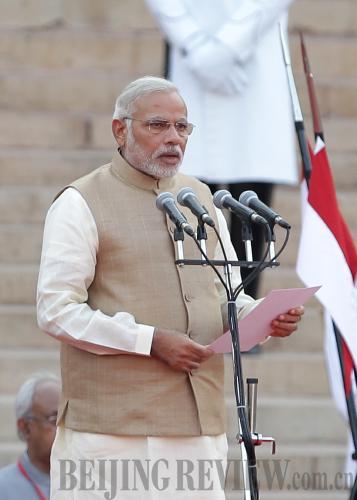|
 |
|
INAUGURATION: India's new Prime Minister Narendra Modi being sworn in on May 26 in New Delhi (XINHUA) |
As two of the largest developing countries in Asia, China and India are frequently mentioned in the same breath. China is the world's most populous country, while India the second. Mumbai is often compared to China's most renowned commercial hub—Shanghai. Now, when the Bharatiya Janata Party (BJP)'s Narendra Modi, who is known for his talent for economic development, sweeps into office as India's prime minister, media are hoping he can help change India in the way Deng Xiaoping changed China.
Ordinary Indians and business leaders have huge expectations of what Modi will be able to deliver to their country. The BJP leader pledged to end policy paralysis, reduce inflation and tackle corruption during his campaign, but some of the toughest hurdles still lie ahead. It seems much easier for the new Indian prime minister to propose such exciting policies than change everything.
Boosting growth
For Modi, who has accrued a wide range of skills in developing the economy in Gujarat, India's fastest developing region, it is reasonable to assume he knows clearly what he has in mind when it comes to handling the current predicament of Indian economy.
Based upon Modi's political career, observers speculate that increasing international cooperation to speed up the development of the Indian economy would be a pivotal move for Modi. As India shares similar national conditions, Modi has shown great interest in China's crusade to transform its economy. Some observers suggest Sino-Indian economic cooperation might see a new high during the Modi administration.
Despite the fact that India has undergone around two decades of relatively swift growth, the prospect of a government led by Modi has boosted Indian stocks by more than 15 percent so far this year. However, the new Indian prime minister still faces the difficulties presented by the huge and diverse country that India is and its extreme inequities, poor infrastructure, and the increasing rural and urban divide.
Data concerning the Indian economy released by global economic organizations are even more alarming. India ranks 60th in the world on the World Economic Forum's 2014 ranking of countries and regions by competitiveness. China's mainland was 29th, while Taiwan and Hong Kong came 12th and 7th respectively. Switzerland came out on top.
Considering the ease of doing business, the World Bank ranks India 134th in the world, while it comes in at only 179th for business opportunity.
The win for the BJP during the general election this time round was mainly on the back of Modi's outstanding performance in developing Gujarat's economy, said Hu Shisheng, Director of the Institute of South and Southeast Asian and Oceanian Studies at the China Institutes of Contemporary International Relations (CICIR).
With Modi using his economic policies as a trump card during the campaign, promoting economic growth will certainly be the focus of his administration, Hu commented. Economic ties between China and India could enter a new phase with the help of Modi's admiration.
According to Hu, manufacturing and infrastructure are the priorities for Sino-Indian cooperation, as they can help the new administration increase employment and improve living standards.
Tang Lu, a senior researcher on world studies at Xinhua News Agency, also noted that Modi personally takes a positive view of China. "The story of China's rapid development might be a motivation for Modi when he served as Gujarat's chief minister. He said he hoped Gujarat can grow as fast as China's Guangdong Province," said Tang.
| 